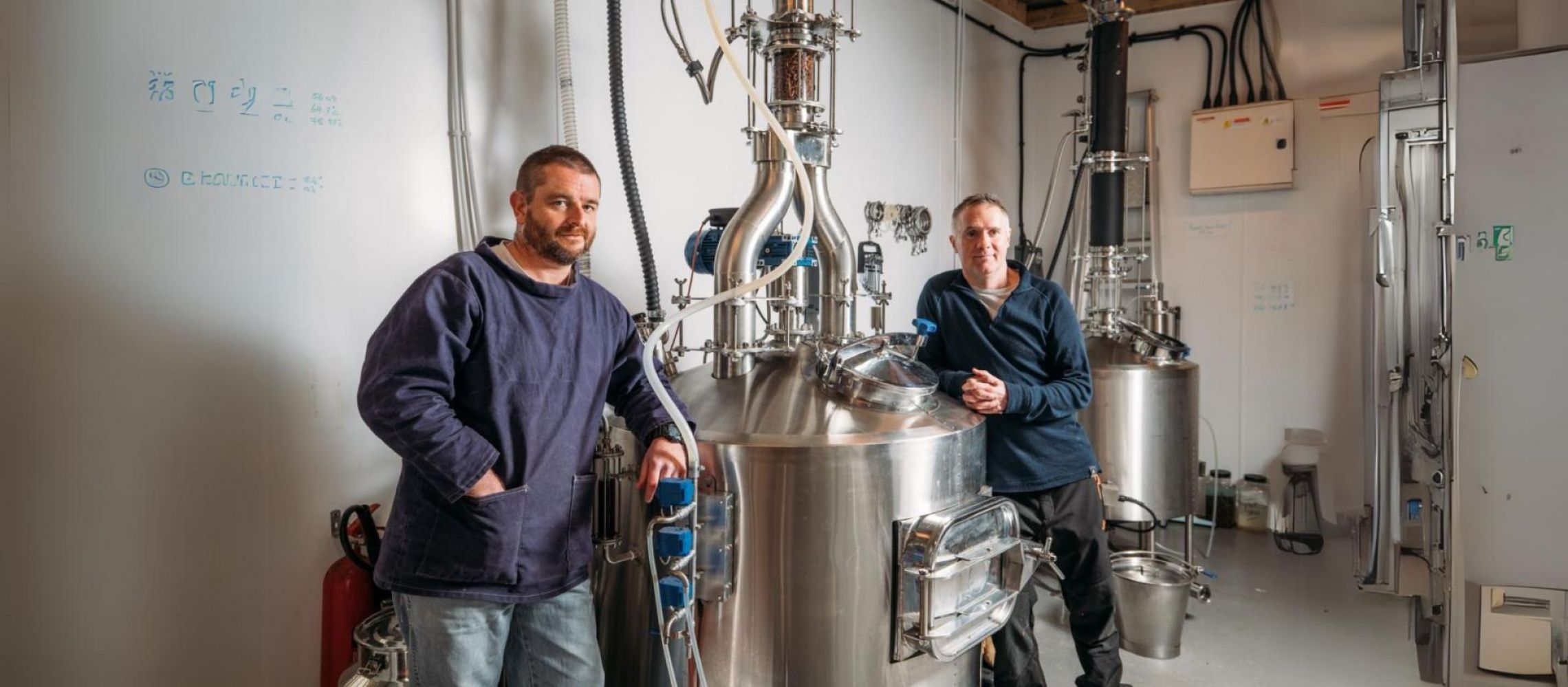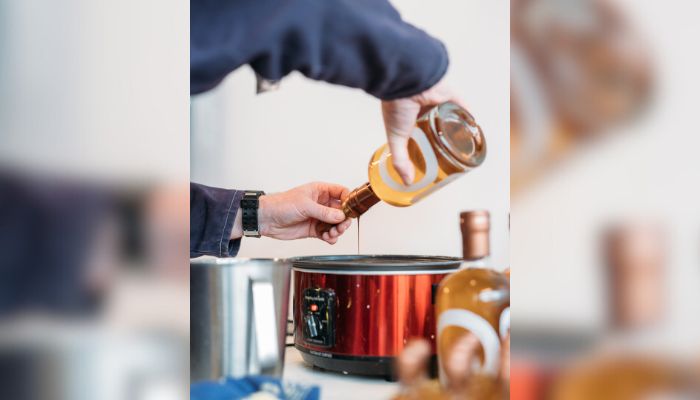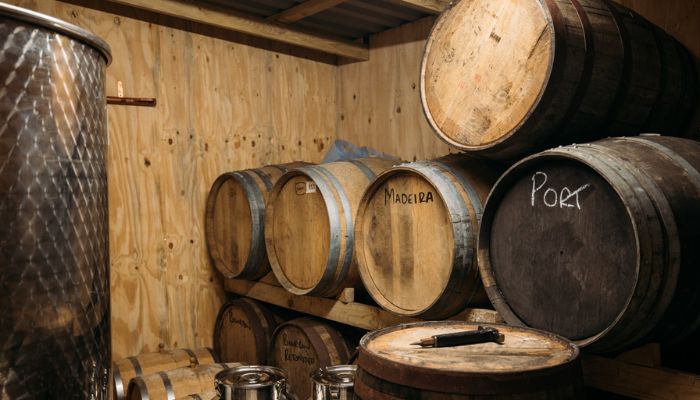Submission Deadline
28 February 2026
Judging
Date
24 & 25 March 2026
Winners Announcement
22 April 2026
28 February 2026
24 & 25 March 2026
22 April 2026

In our latest interview, we are in conversation with Andrew Walder, the chief distiller and proprietor of SC Dogs Distillery, as he discusses his remarkable path into the distilling world and the unique narrative of his family's heritage on the Isles of Scilly. Andrew's enthusiasm for making excellent spirits shines through, from his Merchant Navy adventures to the inspiration for opening his own distillery. In this blog, discover how SC Dogs Distillery not only produces great rums, vodkas, and brandies, but also helps to support the island population. Learn about the challenges and joys of running a small distillery while also examining the complexities of fermentation and the drive for sustainability in the spirits sector.
I was born and grew up on St. Martin’s, the island my family has worked for over 330 years. I’ve spent many happy evenings in the drinking houses across our islands listening to stories of the farmers and fishermen of Scilly, shared over a glass or two of rum - usually with a dash of ‘shrub’.
I also served for 15 years as an officer in the Merchant Navy so I’ve been lucky enough to travel the world and sample many fine rums and vodkas along the way. 10 years of that time was spent working with the British Antarctic Survey in Antarctica where I learnt to appreciate that a warming tot of good quality rum after a 12 hour shift on the ice was a very good end to each day!
Our family has run Carron Farm on St. Martin’s for over 70 years, initially growing scented Narcissi on the Duchy of Cornwall farm tenancy. My mother and father, Stephen and Julia Walder, have supplied milk, beef, fish and shellfish to the islands and more recently we developed a facility which enabled us to harvest, produce and supply sea salt, branded SC Salt.
The idea for SC Dogs Distillery came about when I decided to leave the British Antarctic Survey and make a living at home on the Isles of Scilly, following the birth of our third child. At the time I was serving on a ship that had developed engine issues in Aberdeen whilst returning to base. To kill some time I went on a distillery tour at the ‘Edradour’ Distillery in Pitlochry and that insight into the crafting of spirits sparked my imagination so I started to research what it would take to set up a distillery on the Isles of Scilly.
The aim of SC Dogs distillery is to protect our future livelihoods on the island, give jobs to others but also it’s about supporting other local businesses within the community. Not just on St. Martin’s but across the whole of the Isles of Scilly and particularly the off islands.
Our family were amongst the first settlers on St.Martin’s, so the idea of community, what it means and the lifeline it can be is in our blood.

Image: Andrew Walder | Credits: Adj Brown
Days at the distillery here on St Martin’s can be very varied and you never know what’s going to crop up. This week I have been mainly dealing with the joys of building regulations getting ready to lay the foundations for our new malting floor and tasting room. It could also be moving the cows to fresh pasture, maintaining the pittosporum hedge rows, splicing back ropes for the lobster pots so they are ready for the start of the season for my Dad’s fishing boat the ‘Lowena’ SC2, packing orders of hand made sea salt, rum vodka or brandy to send out in the post to our customers though our website shop or dispatching wholesale orders.
If we are distilling, which we do on average once a month, I start my day at around 0530 going out to the distillery (which just outside the backdoor of the farm house) to turn on the 500 litre pot still to warm up.
Once the children have been taken to school we get to work with taking the fore shots, making the heads cut of the day’s run and monitoring the still as production commences.
We generally try to make best use of the time in the distillery by bottling the next batch of product on our bottling line (sounds grand - we do everything by hand which is pretty labour intensive) and fill a batch into bottles, cork, wax, label and box up ready to fill orders as they arrive.
Once the cuts have been made for the tails, it time to catch up on the never-ending mountain of paperwork, fill wholesale orders and collect the next batch of molasses or cider from the Launch (the interisland freight boat that delivers anything and everything that we can’t grow ourselves here on the farm (or catch in the sea!)).
Once the tails have been stripped from the batch we drain the still and back fill with the next 500 litres, making the most of the heat in the still saving a little energy for the next days run. We run 2 x 2000 litre fermenters so a batch takes us 4 days to process giving us our white rum base spirit from which we make our white, gold spiced rum and we also lay down spirit in various barrels for our aged editions.
We have just released our first barrel aged rum, ‘The Spirit of the Lethbridges’ a whisky barrel-aged rum in collaboration with the RNLI to raise money for their water safety initiatives.

Image: Andrew Walder | Credits: Adj Brown
The idea for SC Dogs distillery came about when I decided to leave the British Antarctic Survey and make a living at home on the Isles of Scilly, following the birth of our third child. At the time I was serving on a ship that had developed engine issues in Aberdeen, whilst returning to base. To kill some time I went on a distillery tour at the ‘Edradour’ Distillery in Pitlochry and that insight into the crafting of spirits sparked my imagination so I started to research what it would take to set up a distillery on the Isles of Scilly.
Maintaining a good team! It is really a family affair. My parents Julia and Steve, and my wife Hannah all support me in the running of the distillery. We get plenty of assistance from my extended family too – whether that be my cousin James who is a successful winemaker in South Australia, Richard who grew up on St. Martin’s and has led the development of the SC Dogs brand and design work, my uncle as electrician or my 97 year old Grandfather (still farming on St. Martin’s!) lending me his Massey Ferguson 135 tractor to prepare the next barley field and his years of experience in growing crops on St. Martin’s.
I think it simply comes down to true provenance. All our products are distilled, aged and bottled on our farm. And the fact that we have managed to create a range of delicately balanced premium rums, vodka, a Scillonian brandy and with a whisky on the way, the products do a lot of the talking for us!
We often use the phrase ‘Crafted by the sea’ – It just means that when we talk about a person or a thing as products of St. Martin’s we are all influenced and formed by the sea that surrounds us.
We are surrounded by rich stories of people whose lives have been shaped by life on the Isles of Scilly, making a livelihood from the sea and so our strapline ‘Spirits of the Isles of Scilly’ means exactly that – premium rums, vodka and brandy distilled from centuries of Island life on the Isles of Scilly.
Definition of a good distiller, well that an interesting question. When running a small business, to be a good distiller requires you to put on many hats. This is something the people from Scilly have over the years mastered. You need to be self-sufficient and turn your hand to almost anything; the distilling the part I most enjoy, creating from scratch products which have the necessary taste profile, quality and consistency to make it into a bottle, but you also have to be able to turn your hand to website maintenance, accountancy, advertising, PR, HR and most of all knowing when to let someone with more expertise help you!
For me it’s the paperwork, monthly warehouse returns, quarterly distillery returns, VAT returns; HMRC does like to pile on the work load, but in the early stages we reached out the Distillers Alliance and Alan Powel who help set us on the straight and narrow so all the daunting tasks have become much more routine.
My name is Andrew, I am the head distiller and owner of SC Dogs Distillery. All our products are distilled, aged and bottled on our farm. We have managed to create a range of delicately balanced premium rums, vodkas and brandy with a clean, rounded finish and a tang of the sea!
Energy costs, duty rises, inflation and cost of living – much the same as everyone is facing.
The rise in cost of energy has got to be the main challenge at the moment and the knock-on effect that has had on the cost of glass, molasses, and running the still along with cost pressures that brings to bare on everything else.
We are in the process of expanding our distillery, with the addition of a tasting room and retail space, along with a dedicated malting facility to enable the scaling of the production of a single malt whisky from barley grown on our farm.
As part of this we are investing in renewable power generation equipment necessary to off-set not only some of the cost but also work toward a net zero production throughout our range.
[[relatedPurchasesItems-63]]
Aside from learning about building regs (and how slow that process can be) I have been reading up about malting of barley. Our malting table is under construction, and nearing completion and soon will be doing some trial runs of malt of the first plough to bottle whisky.
Being up to date with everything in the distillery and getting to going windsurfing!
My current go to tipple is our latest release the Whisky Barrel-Aged Rum. Has hints of sweetness complemented nicely with a smokiness reminiscent of an Islay whisky. Lovely to sit and enjoy on a cold evening in front of the fire!
Wish I had time to read more, so many plates spinning at the moment I don’t get time read as often as I used to! Currently the book on the side is called Malt: A Practical Guide from Field to Brewhouse by John Mallett. Trying to brush up on the processes involved in malting of grain to be used when our new malting table arrives!
We make all our spirits from scratch by fermenting sugar cane molasses, distilling cider from one of the local cider farms or mashing in with our own malted barley, all the liquid we put in a bottle has been fermented, distilled aged and bottled here on the Isles of Scilly.
We do our very best to minimise any waste, reuse, recycle any left overs.
The spent lees from our still is used as a liquid fertiliser, we have made hand sanitiser from the left over cuts from distillation runs and we work with local outlets to collect any used bottles to clean sterilise and refill and any packaging from imported materials are used to ship out the wholesale orders minimising the waste as much as possible.
We have been growing and harvesting barley on the farm which is to be used in our new (currently under construction!) malting facility. Spent grain from the brewing process will be used as animal feed for the cattle on the farm. This will reduce our shipping costs and associated food miles helping toward a net zero target.
Delicately balanced premium rums, vodkas, brandy all distilled, aged and bottled on our farm. Our range of spirits has true Scillonian provenance with a quality and smoothness to be enjoyed neat, over ice or with your favourite mixer.
Time and water is what we use – our fermentation, when making rum, is undertaken using simply yeast, water and molasses. The temperature conditioned fermenters run a slow relatively cool ferment and allow the yeast to do its magic without stressing them with hot and fast conditions. The water, which we draw from a well on the farm, is not chemically treated and as such retains it character and flavour which all aids with the taste profile of the final products.
As part of our malting facility development we have plans to install on site solar power generation which will help off-set electricity consumption throughout the process. In time, with the installation of a ‘sand battery’ we will be able to store heat that can be used to pre warm stills during production runs.
This is always a challenge when living on the Isles of Scilly, our tourist season is short and we are always looking at ways to enter new markets.
Last year we opened up the distillery for Tour and Tasting sessions. These proved very popular with the tourists (and some locals who had not already had a nosy around!) and once the new malting facility is up and running, we are also planning a dedicated tasting room.
SC Dogs Distillery has teamed up with the RNLI on the release of our first barrel aged edition to produce ‘The Spirit of the Lethbridges - Whisky Barrel-Aged Rum’
The perils of the Southwest Approaches have claimed the lives of many a seafarer. Many more have been saved by the unrivalled skill and courage of RNLI lifeboatmen from the Isles of Scilly.
Foremost among them are the Lethbridge family of St. Mary’s. At one time there were six of the clan aboard and for over a century there was always a Lethbridge. For 75 years three generations of Lethbridges – ‘Granfer’ Jim, ‘Father’ Matt and ‘Boy’ Matt – were successive coxswains of the St. Mary’s Lifeboat.
From one Scillonian family to another, we’ve crafted this distinctive rum in their honour. Distilled in small batches from pure local ingredients, aged in old whisky barrels and bottled on our farm, the lingering notes of peat in SC Dogs Whisky Barrel-Aged Rum produces a taste to savour over ice or with your favourite mixer.
You’re doing more than raising a glass. Every bottle will raise money for the RNLI’s water safety initiatives across the Isles of Scilly and Cornwall.
The Lethbridge men never had much time for a drink, but we can celebrate their dedication to our islands and St. Mary’s Lifeboat Station.
Here’s to the spirit of the Lethbridges – coxswains, lifeboat crew, fishermen and SC Dogs, (1862-2010)
£5.00 of the price of the 70cl Whisky Barrel-Aged Rum bottles will be paid in support of the RNLI and its activities on the Isles of Scilly and in Cornwall.
Brexit, Covid, Cost of Living, War in Ukraine and now the Middle East. Don’t dare to forecast what will be next; we have to keep nimble and competitive whist striving to produce the best quality liquid we can to put in a bottle for people to enjoy.
Show your spirits where it matters. Get your products tasted by top bartenders, buyers and experts at the London Competitions — enter now.